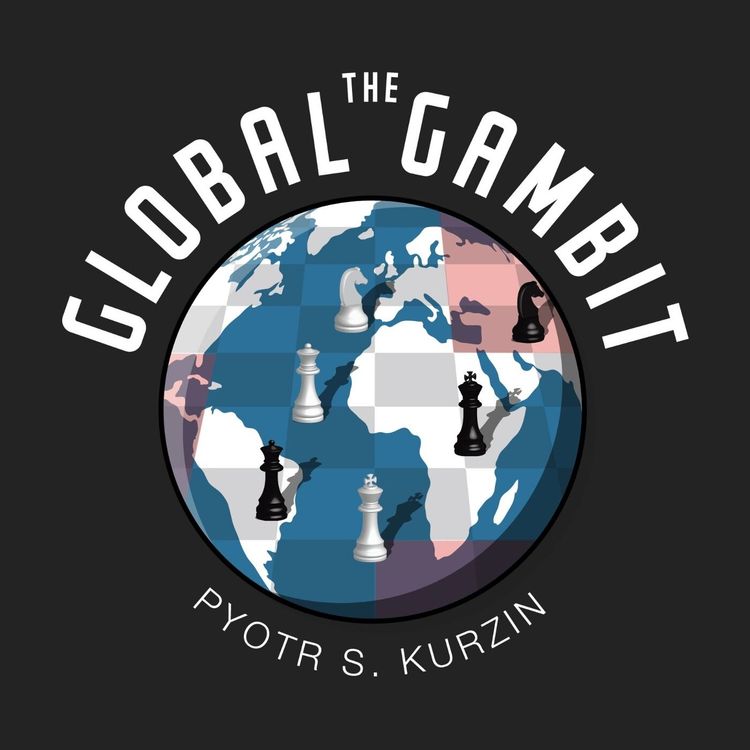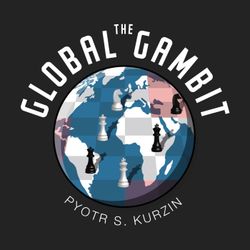Share

The Global Gambit
Will Russia resort to nuclear weapons in Ukraine?
Episode Outline
As the Ukraine War worsens, the threat of nuclear weapons has remained present throughout. Yet, Putin hasn't followed through and so the question remains around the propensity for him to use them, alongside the narratives that emerge on nuclear use more broadly. Alongside scheduled guests, TGG had surprise expert appearances enriching the conversation in the latter half. Questions/themes included:
- What are the current conditions around nuclear weapons and the existing treaties?
- How does Russia approach nuclear weapons and their treatment compared to the West?
- What would be the propensity for Putin to use them and how would the West/NATO respond?
- If Russia did use them, how would that influence other countries who want to pursue nuclear proliferation?
- How significant would tactical nuclear weapons be next to strategic ones/ICBMs?
- How can we improve the narrative surrounding nuclear weapons?
Guest Profiles
This episode had the following experts:
Dr. Alexander Bollfrass works as a Senior Researcher at the ETH Zurich Center for Security Studies. He holds a Ph.D. in Security Studies from Princeton University and worked on nuclear issues at Harvard University's Project on Managing the Atom, as well as the Stimson Center and the Arms Control Association.
Dr. Nicole Grajewski is a Stanton Nuclear Security Post-Doctoral Fellow at Harvard Kennedy School's Belfer Center for Science and International Affairs. A scholar of Russian foreign policy, she holds a Ph.D. in International Relations from the University of Oxford.
Dr. Stephen Herzog is senior Research at the ETH Zurich Center for Security Studies, as well as an Associate of Harvard University's Project on Managing the Atom. He worked for the Federation of American Scientists and at the U.S. Department of Energy. Stephen holds a Ph.D. in Political Science from Yale University.
Surprise appearances were also made by:
Heather Williams, director of the Project on Nuclear Issues and a senior fellow in the International Security Program at CSIS.
Pavel Podvig, a Senior Researcher in the WMD Programme at UNIDIR.
Considering Chipping in to Global Gambit (GG)
This isn't possible without you - the listener. My goal is to bring entertaining yet enlightening content to you, make complex, technical issues more relatable to you, and enable you to engage on topics you care about and for better people from all origins or professions.
So, if any of those resonate with you, consider chipping to the GG, as allows me to improve its quality and elevate the experience for you.
And if you're unable able to do that - no worries. Please leave a review, or share GG. This small action has BIG impact in helping it grow and broaden its visibility to more audiences.
Links
- Pyotr' Twitter: https://twitter.com/pkurzin?lang=en
- TGG Twitter: https://twitter.com/theglobalgambit
- Patreon: https://www.patreon.com/login?ru=%2Ftheglobalgambit
- Substack: https://pyotrskurzin.substack.com/
Read as well as listen as l overthink for you: https://substack.com/@pyotrskurzin
- X/Twitter: https://twitter.com/PKurzin
- YouTube: https://www.youtube.com/channel/UC7-TPqKMViddKZeo4K2P2jg/
- Patreon: https://www.patreon.com/theglobalgambit
- Buy Me a Coffee: https://www.buymeacoffee.com/theglobalgambit
Leave a quick rating—it's free, easy, and honestly, the least you can do after I've blessed your ears with such wisdom. Where would you be without me?
More episodes
View all episodes

Something Doesn't Make Sense in the US-Iran Escalation
36:33|The United States has deployed one of its largest military buildups in the Middle East in decades — and yet, nothing has happened. So why assemble overwhelming force if conflict was never inevitable?In this episode, Pyotr Kurzin speaks with Con Coughlin, Defence and Foreign Affairs Editor at The Daily Telegraph, to unpack the real strategy behind America’s military pressure on Iran. We explore how Donald Trump is using military leverage to force a new nuclear deal, why Iran’s weakened regional position has shifted the balance, and how Tehran is relying on diplomacy, Russia, and China to survive.This is a conversation about coercion, credibility, and why the most powerful military deployments are often designed not to be used — but to reshape the negotiating table.Chapters00:00 The Military Buildup and Its Implications10:01 Iran's Current Position and Internal Dynamics19:57 The Role of External Influences and Regional Dynamics29:42 Future Scenarios: Engagement or Conflict?
The Biggest Weakness in Britain’s Defence Strategy
34:41|SummaryIn this episode I engage Larissa Brown, the defence editor at The Times, to discuss the current state of geopolitics, defence dynamics, and the implications of the ongoing conflict in Ukraine. They explore insights from the Munich Security Conference, the UK's defence spending, military readiness, and the evolving threat posed by Russia. The conversation also delves into the US-UK defence relationship, public sentiment on military spending, and the challenges facing the UK military in terms of manpower and logistics. As they look ahead, they consider the impact of populism on European defence and the importance of collaboration among European nations.Chapters00:00 Introduction to Geopolitics and Defense Dynamics02:38 Insights from the Munich Security Conference05:41 Assessing the UK Military's Readiness08:26 The Threat of Russia and Hybrid Warfare11:22 UK's Defense Spending and Political Challenges14:08 The US-UK Defense Relationship16:43 European Strategic Autonomy and Cooperation19:36 The Role of Drones in Modern Warfare22:28 Joint Operations Against ISIS and Future Threats25:02 The Future of UK Defense and European Relations28:17 Looking Ahead: Key Global Events and Developments
How Europe is Going After Russia's Shadow Fleet
23:56|SummaryIn this conversation, Edward Lucas discusses the ongoing war in Ukraine, the influence of Donald Trump on NATO and European defense, and the shifting dynamics of power in Europe. He emphasises the need for Europe to enhance its military autonomy and the importance of a united front against Russia. Lucas also addresses the concept of the 'shadow fleet' and the implications of European actions on Russia's strategic calculations. The discussion highlights the complexities of international relations and the necessity for Europe to adapt to changing geopolitical realities.Chapters00:00 Current State of Trilateral Talks03:59 The Role of the United States in European Security09:55 Europe's Defense Capabilities and Autonomy15:47 The Shadow Fleet and European Responses21:38 Final Thoughts and Future Outlook
Iran’s Protests and the New Middle East Balance of Power
47:07|SummaryIn this episode, Pyotr Kurzin engages with Trita Parsi, the Executive Vice President of the Quincy Institute, to discuss the evolving geopolitical landscape in Iran and the broader Middle East. They delve into the implications of the recent leadership changes in Iran, particularly following the death of President Raisi, and how this has affected the political dynamics within the country. Parsi emphasizes the incompetence of the previous government and the ongoing protests, highlighting the deep-seated frustrations among the Iranian populace regarding economic mismanagement and political repression. The conversation also touches on the significant internet blackout in Iran, which has hindered communication and information flow, further complicating the situation.Chapters00:00 Introduction to Iran's Current Landscape14:47 Leadership Changes and Public Sentiment17:44 The Impact of Protests and Government Response21:45 Internet Shutdown: A Sign of Desperation24:34 Violence and the Role of the IRGC27:28 Civil Liberties and Digital Isolation29:55 Geopolitical Context and Regional Dynamics37:32 The Future of Iran in a Changing Middle EastSubscribe to the YouTube channel and Substack newsletter for more content like this.
Is the global economy as we know it over?
38:49|SummaryIn this conversation, Martin Wolf discusses the current state of the global economy, emphasizing the importance of demographic changes, economic growth, and the resilience of economies in the face of challenges. He highlights the political fragility in Europe and the US, the risks associated with transatlantic relations, and the need for Europe to strengthen its position in a multipolar world. The discussion also touches on the fragmentation of regional blocks and the uncertainty surrounding the future of global governance.Chapters00:00 Reflections on Global Economic Trends08:52 Political Fragility and Economic Growth17:51 The Future of Transatlantic Relations26:37 Europe's Strategic Challenges Ahead35:07 Navigating a New World OrderSubscribe to the YouTube channel and Substack newsletter for the latest content.
Has America declared a 'culture war' on Europe?
29:13|SummaryIn this conversation, Pyotr Kurzin and Dmitri Alperovitch delve into the intricate relationship between geoeconomics and geopolitics, particularly in the context of the United States' National Security Strategy. They discuss the implications of Trump's approach to international relations, the challenges Europe faces in achieving strategic autonomy, and the complexities surrounding tariffs and economic strategies. The dialogue also touches on the ongoing Russia-Ukraine war and the potential risks associated with seizing Russian sovereign assets.Subscribe to the YouTube channel and Substack newsletter for the latest content.
Is this newest Ukraine Peace Plan the actual one?
38:43|SummaryIn this episode of Global Gambit, host Pyotr Kurzin engages with Lawrence Freedman, a prominent figure in military strategy, to dissect the recent 28-point peace plan regarding the Russia-Ukraine conflict. Kurzin expresses skepticism about the plan's legitimacy, noting its repetitive nature and the lack of serious diplomatic engagement. Freedman elaborates on the origins of the plan, highlighting its amateurish drafting and the absence of meaningful discussions between Russia and Ukraine. He critiques the plan's vague language and unrealistic expectations, suggesting that it may not lead to a viable resolution of the ongoing conflict.As the conversation progresses, Freedman discusses the implications of the plan for both Ukraine and Russia, emphasizing the need for a more robust diplomatic framework. He also touches on the current military situation, including the challenges faced by both sides as winter approaches. The episode concludes with a reflection on the broader geopolitical landscape, urging listeners to consider the complexities of international relations and the potential for escalation in the region. Freedman's insights provide a nuanced understanding of the ongoing conflict and the challenges of achieving lasting peace.Subscribe to the YouTube channel and Substack newsletter for the latest content.
What Is Really Driving Tensions Between Pakistan and Afghanistan?
26:48||Season 2SummaryThis conversation delves into the complex and evolving tensions between Afghanistan and Pakistan, focusing on the recent ceasefire, the role of the Tehrik-i-Taliban Pakistan (TTP), and the broader geopolitical implications of the Taliban's legitimacy. Michael Kugelman provides insights into the historical context of the violence, the political instability in Pakistan, and the international mediation efforts by countries like Qatar and Turkey. The discussion also highlights the challenges Pakistan faces in managing its relationships with militant groups and the potential future scenarios for border security.Subscribe to the YouTube channel and Substack newsletter for the latest content.
Will Emerging Markets Lead the Next Financial Revolution?
34:19||Season 2SummaryIn this conversation, Pyotr Kurzin and Mitch Mechigian discuss the evolving landscape of geopolitics and finance, particularly focusing on the role of cryptocurrencies and stablecoins. They explore Trump's shift from skepticism to support for crypto, the normalization of digital currencies among nation-states, and the implications of geopolitical events on the crypto market. The discussion also highlights the rise of stablecoins as a significant player in the financial system and the potential for emerging markets to lead the next wave of crypto adoption.